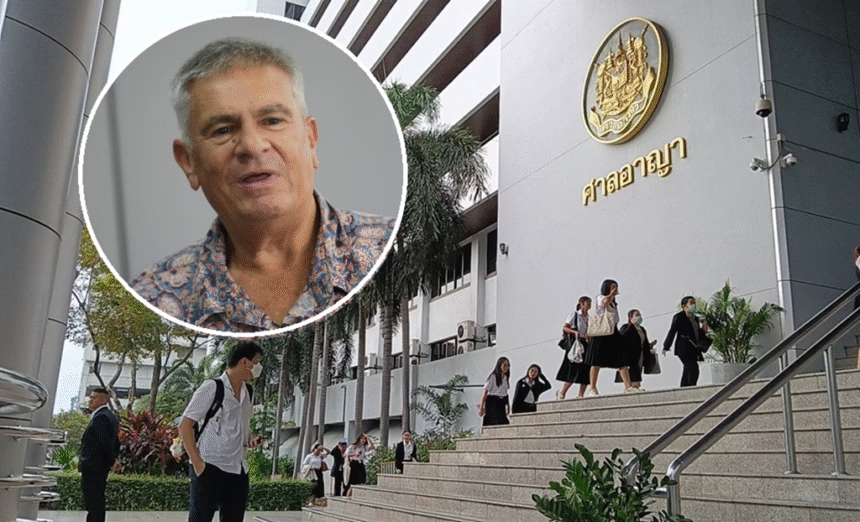BANGKOK – In a decision that has alarmed journalists across Southeast Asia, a Bangkok criminal court has formally charged Australian freelance journalist Murray Hunter with criminal defamation. Legal analysts describe the case as an unusual form of cross-border repression and a sign of how state bodies increasingly use legal systems abroad to target critics.
Hunter, a 66-year-old independent academic and long-time blogger known for his strong views on Malaysian politics, is set to stand trial on 22 December. The charges relate to four articles he published on his Substack newsletter in April 2024.
In those posts, he accused Malaysia’s Communications and Multimedia Commission (MCMC) of abusing its powers, acting with conflicts of interest, and using threats to shut down open debate. The articles, now blocked in Malaysia, described the MCMC as politically driven under Prime Minister Anwar Ibrahim. The commission has rejected the claims, calling them “baseless” and “slanderous”.
The indictment comes after Hunter’s sudden arrest on 29 September 2025 at Bangkok’s Suvarnabhumi International Airport. While he sat at breakfast with a coffee, waiting to fly to Hong Kong for a short break with his son, Thai immigration officers detained him without advance notice.
He was handcuffed, taken to Yannawa Police Station, and spent the night in a holding cell. He walked free the next morning after posting 20,000 baht (about 620 US dollars) in bail. Authorities seized his passport, which has kept him stuck in Bangkok and upended his home life in Hat Yai in southern Thailand, where he has lived for years after teaching at a Malaysian university until 2015.
Prosecutors have charged Hunter under Section 328 of Thailand’s Criminal Code, which outlaws defamation committed through published or broadcast material. A conviction could bring up to two years in prison and a fine of 200,000 baht (around 6,180 US dollars). Press freedom advocates call the penalties excessive for work they view as standard journalistic scrutiny.
“This is not justice, it is a weapon,” Hunter told reporters after his release, sounding stunned. “I have not broken any law in Thailand. The MCMC abused the system to track me down here and turned national borders into a net to catch anyone who disagrees.”
A “transnational SLAPP” and the cross-border use of defamation law
Thai Lawyers for Human Rights (TLHR), a leading rights organisation, has described the case as a “transnational SLAPP”, using the acronym for Strategic Lawsuits Against Public Participation. SLAPP cases usually aim to exhaust, frighten, or silence critics rather than win fair judgments.
In Hunter’s case, the MCMC filed complaints in both Malaysia and Thailand. The Southern Bangkok Criminal Court issued an arrest warrant as early as 27 March 2025. A Malaysian representative, acting with the power of attorney, complained to Thailand and argued that the articles could be read there and were therefore defamatory inside Thai territory.
“This is a shocking step up in repression,” TLHR said in a statement last week. “By asking another country to prosecute a critic, Malaysia is exporting its refusal to tolerate public scrutiny. Thai courts risk helping a foreign agency silence those who question public authorities.”
The group also pointed out that Hunter did not know about related civil proceedings in Malaysia. In October 2025, a Malaysian High Court found him liable for defamation without him being directly involved in the case. Rights advocates say this kind of process looks like an ambush and raises serious fairness concerns.
Observers link Hunter’s case to a wider pattern of “swap mart” arrangements inside ASEAN, where governments quietly cooperate over dissidents. In the past, Thailand has faced criticism for detaining foreign activists, often in exchange for the friendly treatment of Thai exiles abroad. One high-profile case was the 2018 detention of Bahraini refugee footballer Hakeem al-Araibi, where strong international pressure stopped his extradition.
Hunter’s situation is different in one key way. The alleged wrongdoing took place online and targeted a Malaysian authority, yet the prosecution is unfolding in a Thai courtroom.
Growing concern for exiled journalists and free expression in Southeast Asia
The indictment has drawn strong criticism from press freedom groups, who warn that Thailand’s reputation as a safer base for regional journalists could be at risk. Many reporters from Myanmar, Cambodia, and Laos have seen Bangkok and Chiang Mai as practical refuges from crackdowns at home.
Shawn Crispin, senior Southeast Asia representative for the Committee to Protect Journalists (CPJ), urged Thai authorities to walk away from the case. “Thai authorities should drop this farce and give Hunter his passport back,” he said. “Courts here are not supposed to be weapons for foreign grudges. This puts every journalist in Thailand who writes about a neighbouring government in danger.”
Phil Robertson, director of Asia Human Rights & Labor Advocates, used even sharper language in a post on X, formerly Twitter. “Malaysia is engaged in blatant transnational repression,” he wrote. “Anwar Ibrahim has moved far from his human rights promises, he should tell the MCMC to stop and ask Thailand to quit this case.”
Robertson argued that Thai police and prosecutors were being “played for fools” and ignoring the wider political agenda.
In Malaysia, local media and rights groups have reacted with anger. The Malaysian Centre for Independent Journalism (CIJ) and PEN Malaysia released a joint statement condemning the cross-border hunt for a critic as a betrayal of constitutional free speech rights.
“Public money to chase down writers? The MCMC should be dealing with scams and hate speech, not going after bloggers,” they wrote.
Lawyers for Liberty echoed this criticism, calling the police report against Hunter “high-handed” and a threat to open debate. “Public institutions must put up with criticism, they serve the people, they are not above them,” the group said.
Australia, where Hunter is a citizen, has also started to respond. The Department of Foreign Affairs and Trade has confirmed that it is following the case. Coverage by outlets including ABC News has framed the incident as a warning to Australian writers who live and work overseas.
“If this can happen to Murray, who is next?” one Australian journalist based in Bangkok said anonymously. “Reporters in Thailand are nervous.”
Hunter says he will not back down. “My work was in the public interest, showing how the MCMC shuts down facts under Anwar’s leadership,” he said in a recent interview. He has also spoken about filing counterclaims for harassment and intimidation.
His next court date is set for 21 December. In a rare move, the judge has encouraged both sides to consider mediation.
Whatever the outcome, the case highlights a growing threat to media freedom in Southeast Asia. As states extend their reach across borders and into online spaces, criticism can quickly shift from opinion to alleged crime.
For now, Hunter’s indictment stands as a stark warning that, in the eyes of some regulators, the written word is not only powerful, it is also punishable.















